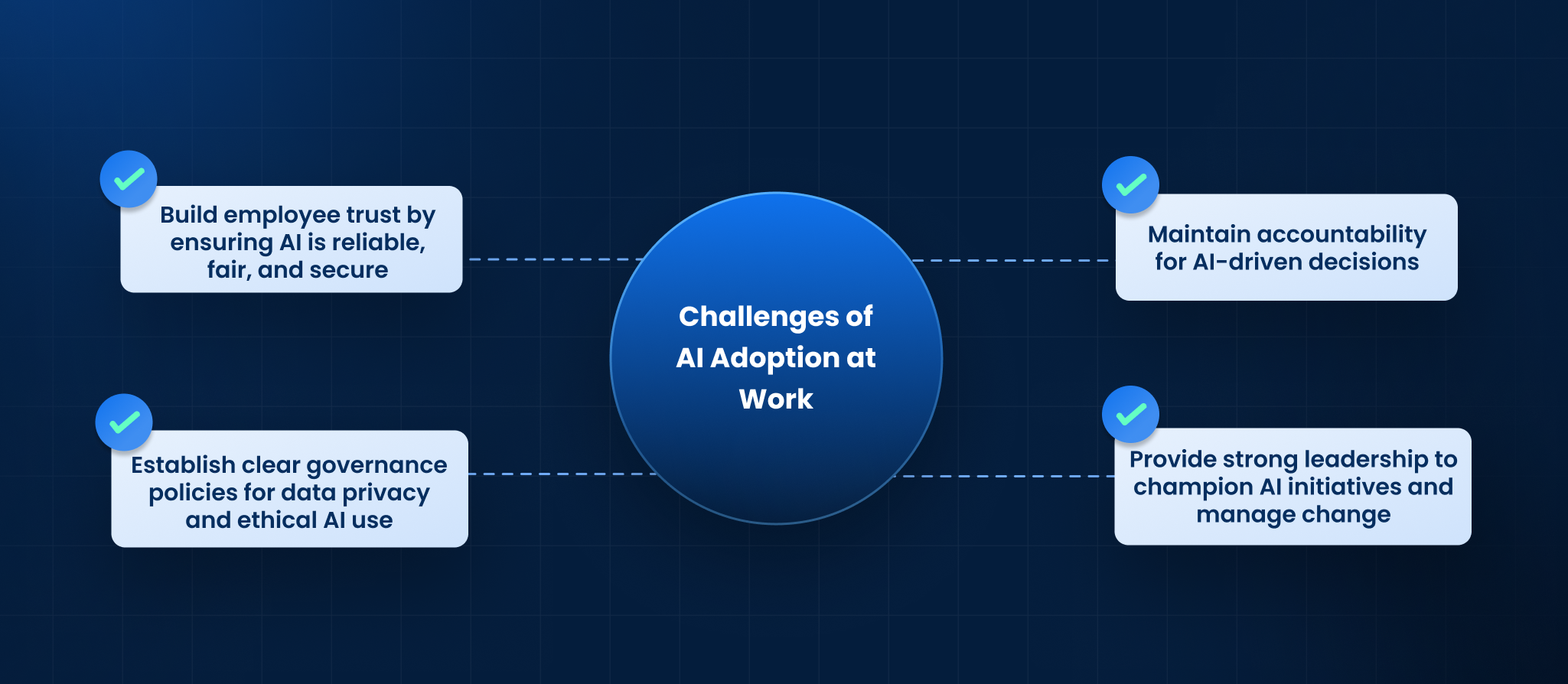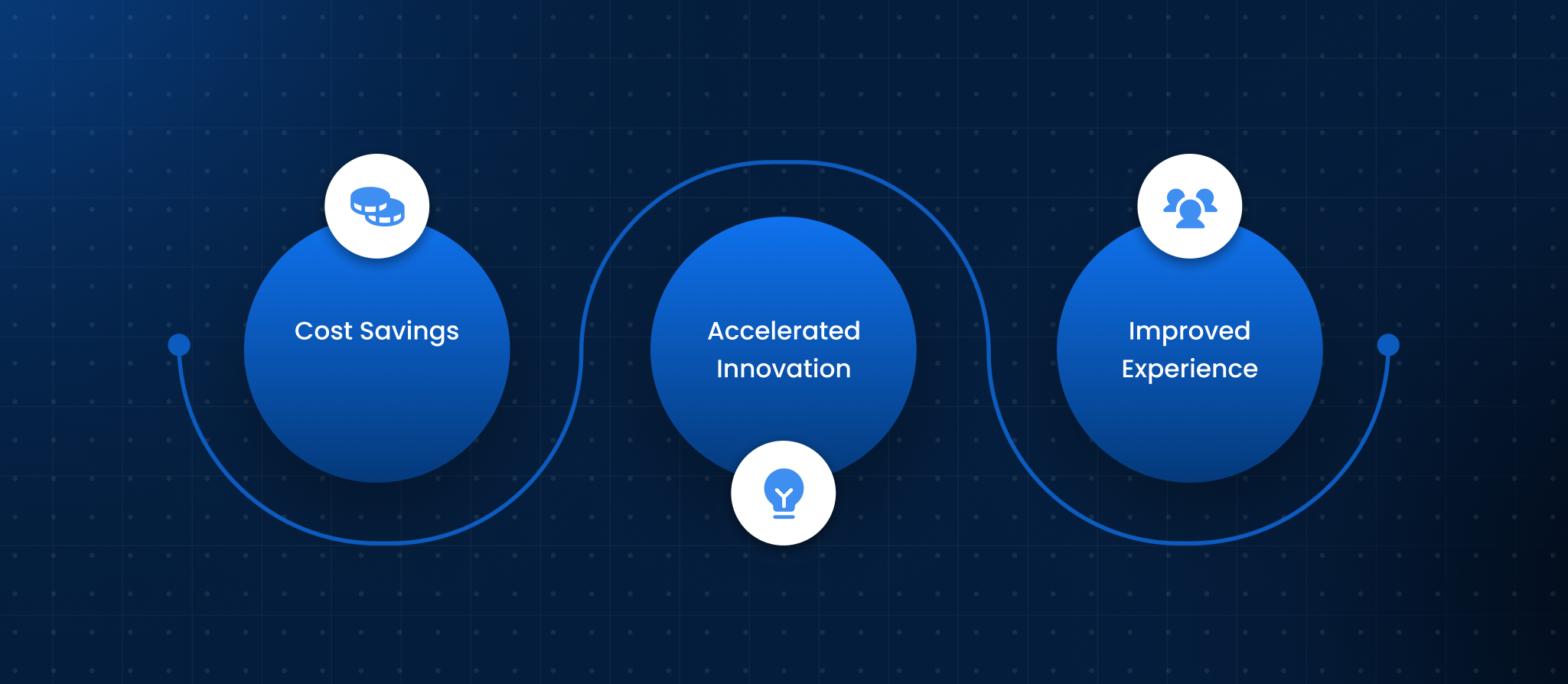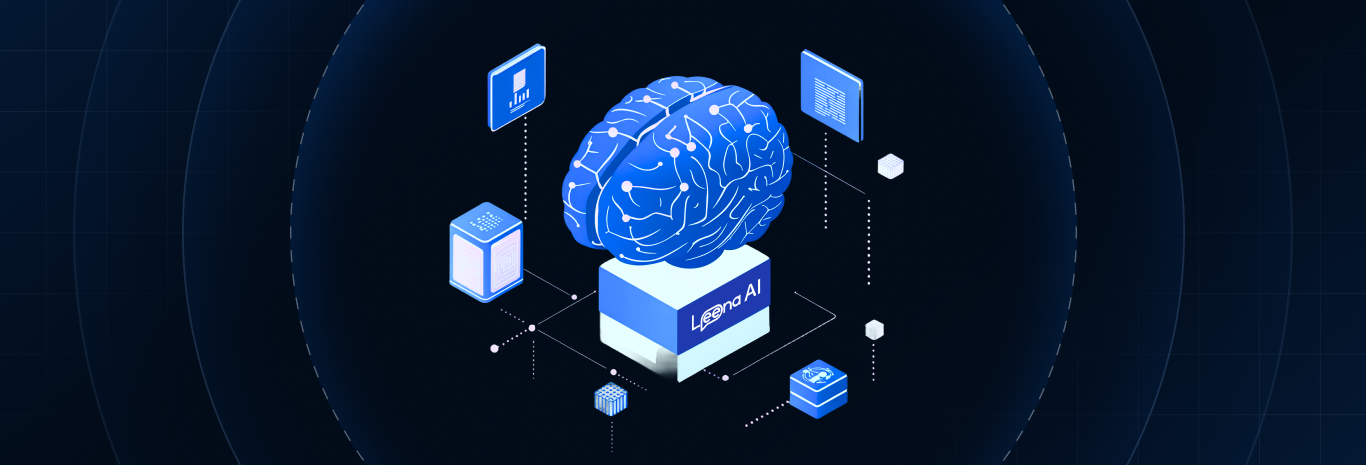Introduction
The landscape of work is shifting, and at the heart of this transformation is artificial intelligence in the workplace. For leaders who oversee the critical systems that keep large US companies running, including your IT, HR, and Finance operations, this isn’t just a trend. It’s a strategic imperative. As we look towards 2025, the conversation has moved beyond mere automation. We are now witnessing the dawn of intelligent systems that proactively resolve issues, empower employees, and fundamentally redefine efficiency. This evolution promises not just cost savings, but a truly frictionless and productive environment for your entire organization.
What Artificial Intelligence Means in Modern Workplaces
Understanding artificial intelligence in the workplace starts with recognizing its multifaceted impact. In modern workplaces, artificial intelligence is no longer a futuristic concept. Instead, it is a practical tool augmenting human capabilities and streamlining operations. It involves smart software that can learn from data, understand human language, and even make informed decisions. This technology helps your employees get answers faster and resolves their operational hurdles with unprecedented speed.
Specifically, AI is changing how we interact with internal support systems. Gone are the days of endless email chains or waiting on hold. Intelligent agents powered by artificial intelligence can now handle routine inquiries, guide users through complex processes, and even anticipate needs before they arise. Therefore, your IT help desk, HR inquiries, and finance requests become more efficient and user-friendly. This means less frustration for your workforce and more time for your teams to focus on strategic initiatives. Ultimately, AI elevates the entire employee experience.
AI as a Catalyst for Employee Productivity and Well-Being
Imagine a world where your employees spend less time battling technical glitches or chasing down HR policies. This is the promise of artificial intelligence in the workplace when applied strategically. AI acts as a powerful catalyst for both employee productivity and overall well-being. By automating repetitive tasks, intelligent systems free up your team members from mundane work. Consequently, they can dedicate their energy to more creative, complex, and rewarding projects.
Consider the impact on employee satisfaction. When questions are answered instantly, and issues are resolved swiftly, frustration melts away. This leads to a more positive and engaging work environment. Moreover, artificial intelligence can provide personalized support, tailoring solutions to individual employee needs. This personalized approach not only boosts efficiency but also contributes significantly to a sense of being valued. Hence, a well-supported employee is a more productive and happier employee. It is a win-win for everyone involved.
The Rise of “Superagency”: Empowering Workers with AI
In 2025, the concept of “superagency” is emerging as a critical trend driven by artificial intelligence in the workplace. Superagency refers to the amplification of an individual worker’s capabilities and impact through intelligent tools. It’s about empowering employees to achieve more, faster, and with greater accuracy, than ever before. AI transforms workers from passive users into highly effective problem-solvers.
For instance, an AI assistant can quickly retrieve precise information from vast internal databases, synthesize it, and present actionable insights. This allows employees to make better decisions and complete tasks with newfound speed. Consequently, workers gain a remarkable ability to navigate complex processes and resolve intricate challenges independently. This empowerment reduces reliance on specialized support teams for every minor issue. It fosters a culture of self-sufficiency and continuous learning within your organization.
Challenges of AI Adoption at Work: Trust, Governance, and Leadership
While the benefits of artificial intelligence in the workplace are clear, successful adoption requires navigating specific challenges. These primarily revolve around building trust, establishing robust governance, and providing strong leadership. Employees need to trust that AI systems are reliable, fair, and secure. Without this trust, adoption will be slow and resistant. Therefore, transparency in how AI operates and handles data is paramount.
Effective governance is another vital component. This means creating clear policies around data privacy, ethical AI use, and accountability for AI-driven decisions. Leaders must ensure that AI systems comply with all relevant regulations and internal standards. Furthermore, strong leadership is essential to champion AI initiatives, communicate their value, and manage the organizational change effectively. Leaders must educate their teams, address concerns, and guide the integration of AI into existing workflows. Overcoming these hurdles ensures a smooth and beneficial transition to an AI-powered enterprise.

AI in HR and IT: Transforming Talent, Service, and Workflow Optimization
The application of artificial intelligence in the workplace truly shines in specific departments like Human Resources and Information Technology. Here, AI is fundamentally transforming talent management, service delivery, and workflow optimization. In HR, intelligent systems can streamline recruiting, personalize employee learning paths, and automate onboarding. This frees HR professionals to focus on strategic talent development and employee engagement initiatives.
For IT departments, AI is a game-changer for ticketing systems and operational efficiency. Predictive analytics, for example, allows IT to identify and resolve potential issues before they impact employees, leading to a “zero-ticket” ideal. Automated issue resolution significantly reduces the workload on support teams, allowing them to tackle more complex problems. This improves service levels and reduces downtime across the organization. Both HR and IT benefit from AI’s ability to analyze vast amounts of data, uncover patterns, and automate repetitive tasks, making their operations more agile and responsive.
Real-World AI Impact: Cost Savings, Innovation, and Experience
The tangible impact of artificial intelligence in the workplace extends across three critical dimensions: significant cost savings, accelerated innovation, and a vastly improved experience for everyone. Enterprises are realizing substantial financial benefits by automating routine tasks and optimizing resource allocation. This means fewer hours spent on repetitive administrative duties and a more efficient use of your highly skilled workforce. Therefore, your operational budgets are better utilized.
Beyond cost savings, AI fosters a culture of innovation. By automating the mundane, your teams have more bandwidth to explore new ideas, develop groundbreaking solutions, and drive strategic growth. Furthermore, the employee experience transforms dramatically. Instant answers, proactive support, and personalized interactions lead to higher satisfaction and engagement. This creates a more productive and happier workforce. These real-world impacts underscore AI’s role as a strategic advantage for any forward-thinking enterprise.

Leena AI’s Pioneering “Agentic AI in IT” Solutions
At Leena AI, we are at the forefront of delivering powerful artificial intelligence in the workplace through our innovative agentic AI solutions. Our approach focuses on creating “AI colleagues” that intelligently understand, respond, and resolve employee requests across IT, HR, and Finance. Specifically for IT, our agentic AI solutions are designed to dramatically reduce ticket volumes and improve resolution times.
Imagine an AI that proactively monitors system health, predicts potential outages, and initiates automated fixes before any employee even notices an issue. That is the essence of our “zero-ticket” vision. Our AI can automatically create tickets when needed, classify them accurately, and even escalate to the right human agent with all necessary context. It seamlessly integrates with your existing tools like ServiceNow, Jira, and Salesforce. This ensures a smooth transition and immediate value. Our voice-enabled AI colleagues transform how employees interact with IT support, providing instant, conversational assistance. This provides a truly frictionless employee experience. Leena AI empowers your enterprise to achieve unprecedented operational efficiency and employee satisfaction through intelligent automation.
How Leena AI’s Voice-Enabled AI Colleagues Transform the Employee Experience
The power of voice is undeniable, and Leena AI harnesses this with our voice-enabled AI colleagues, revolutionizing the employee experience with artificial intelligence in the workplace. Employees can simply speak their requests or questions, just as they would to a human colleague. This natural interaction removes barriers and makes accessing support incredibly intuitive. Whether it’s resetting a password, checking on a benefits claim, or submitting a finance query, a simple voice command can initiate the resolution.
This natural language capability means employees don’t need to navigate complex menus or fill out lengthy forms. They can get immediate, accurate assistance from their desktop, phone, or even smart speakers within the office. The AI understands context, asks clarifying questions, and guides the employee towards a solution. This not only speeds up resolution but also enhances accessibility for all employees. It delivers a personalized, effortless support experience that truly transforms daily interactions and boosts overall satisfaction.
Frequently Asked Questions about Artificial Intelligence in the Workplace
1. What are the main benefits of integrating artificial intelligence in the workplace?
The primary benefits include increased efficiency, significant cost savings through automation, enhanced employee productivity, and a much-improved overall employee experience by providing faster, more accurate support.
2. How does AI specifically help with IT ticketing systems?
AI transforms IT ticketing by automating routine requests, classifying issues more accurately, proactively identifying and resolving problems before they impact users, and providing immediate answers to common questions, thus reducing human agent workload.
3. Is artificial intelligence in the workplace secure for sensitive company data?
Yes, when implemented correctly with robust governance frameworks, data encryption, and strict privacy policies, AI systems are designed to handle sensitive data securely. Choosing a trusted vendor with strong security protocols is crucial.
4. Will artificial intelligence replace human jobs in the workplace?
Generally, AI is seen as an augmentative technology, not a replacement. It takes over repetitive and mundane tasks, freeing human employees to focus on more complex, creative, and strategic work, thereby enhancing human capabilities.
5. How can a company begin adopting artificial intelligence in the workplace?
A great starting point is to identify areas with high volumes of repetitive inquiries, such as IT help desks or HR support. Pilot programs with solutions like Leena AI’s agentic AI can demonstrate clear value quickly.
Agentic AI refers to intelligent systems that can not only understand requests but also take proactive actions and make decisions to resolve issues autonomously. It goes beyond simple chatbots to truly act as an “AI colleague” in the workplace.
7. How does Leena AI utilize voice technology to improve the employee experience?
Leena AI’s voice-enabled AI colleagues allow employees to simply speak their IT, HR, or Finance questions and requests. This natural interaction provides instant, conversational support, making access to help incredibly easy and intuitive for everyone.













